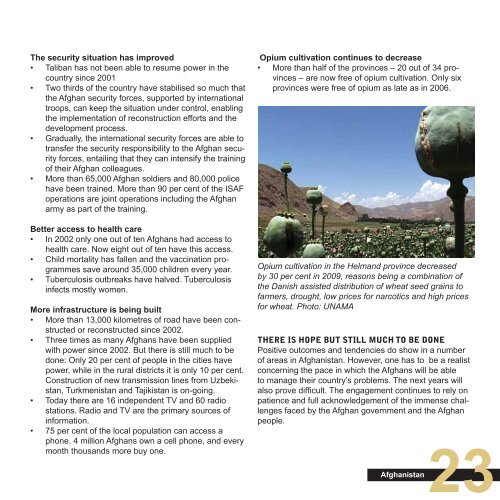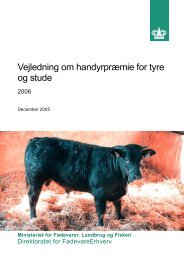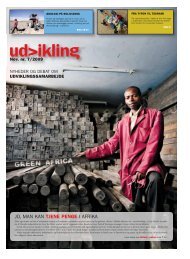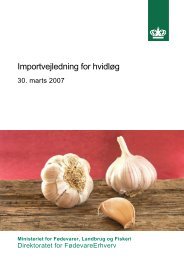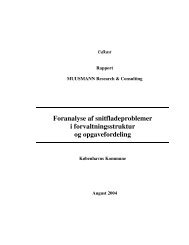DENMARK IN AFGHANISTAN
DENMARK IN AFGHANISTAN
DENMARK IN AFGHANISTAN
Create successful ePaper yourself
Turn your PDF publications into a flip-book with our unique Google optimized e-Paper software.
The security situation has improved<br />
�� Taliban has not been able to resume power in the<br />
country since 2001<br />
�� Two thirds of the country have stabilised so much that<br />
the Afghan security forces, supported by international<br />
troops, can keep the situation under control, enabling<br />
the implementation of reconstruction efforts and the<br />
development process.<br />
�� Gradually, the international security forces are able to<br />
transfer the security responsibility to the Afghan security<br />
forces, entailing that they can intensify the training<br />
of their Afghan colleagues.<br />
�� ���������������������������������������������������<br />
have been trained. More than 90 per cent of the ISAF<br />
operations are joint operations including the Afghan<br />
army as part of the training.<br />
Better access to health care<br />
�� In 2002 only one out of ten Afghans had access to<br />
health care. Now eight out of ten have this access.<br />
�� Child mortality has fallen and the vaccination programmes<br />
save around 35,000 children every year.<br />
�� Tuberculosis outbreaks have halved. Tuberculosis<br />
infects mostly women.<br />
More infrastructure is being built<br />
�� More than 13,000 kilometres of road have been constructed<br />
or reconstructed since 2002.<br />
�� Three times as many Afghans have been supplied<br />
with power since 2002. But there is still much to be<br />
done: Only 20 per cent of people in the cities have<br />
power, while in the rural districts it is only 10 per cent.<br />
Construction of new transmission lines from Uzbekistan,<br />
Turkmenistan and Tajikistan is on-going.<br />
�� �����������������������������������������������<br />
��������������������������������������������������<br />
information.<br />
�� �������������������������������������������������<br />
phone. 4 million Afghans own a cell phone, and every<br />
month thousands more buy one.<br />
Opium cultivation continues to decrease<br />
�� More than half of the provinces – 20 out of 34 provinces<br />
– are now free of opium cultivation. Only six<br />
������������������������������������������������<br />
Opium cultivation in the Helmand province decreased<br />
�������������������������������������������������������<br />
the Danish assisted distribution of wheat seed grains to<br />
farmers, drought, low prices for narcotics and high prices<br />
�����������������������<br />
THERE IS HOPE BUT STILL MUCH TO BE DONE<br />
Positive outcomes and tendencies do show in a number<br />
of areas in Afghanistan. However, one has to be a realist<br />
concerning the pace in which the Afghans will be able<br />
to manage their country’s problems. The next years will<br />
���������������������������������������������������������<br />
patience and full acknowledgement of the immense challenges<br />
faced by the Afghan government and the Afghan<br />
people.<br />
23<br />
Afghanistan


